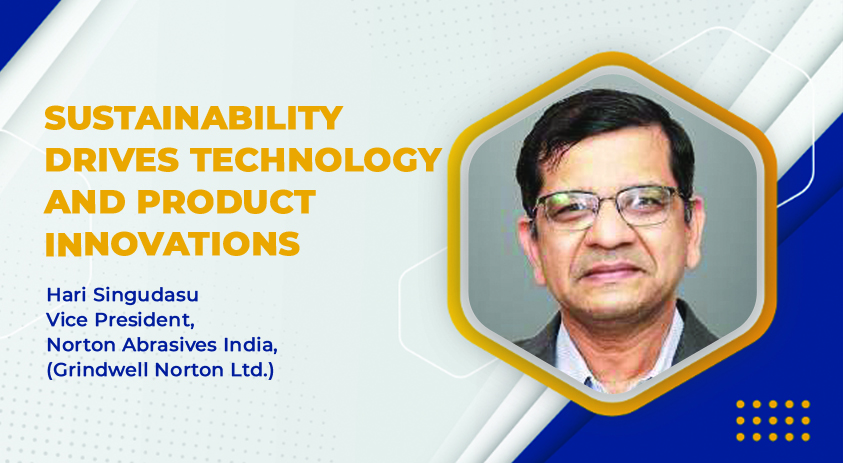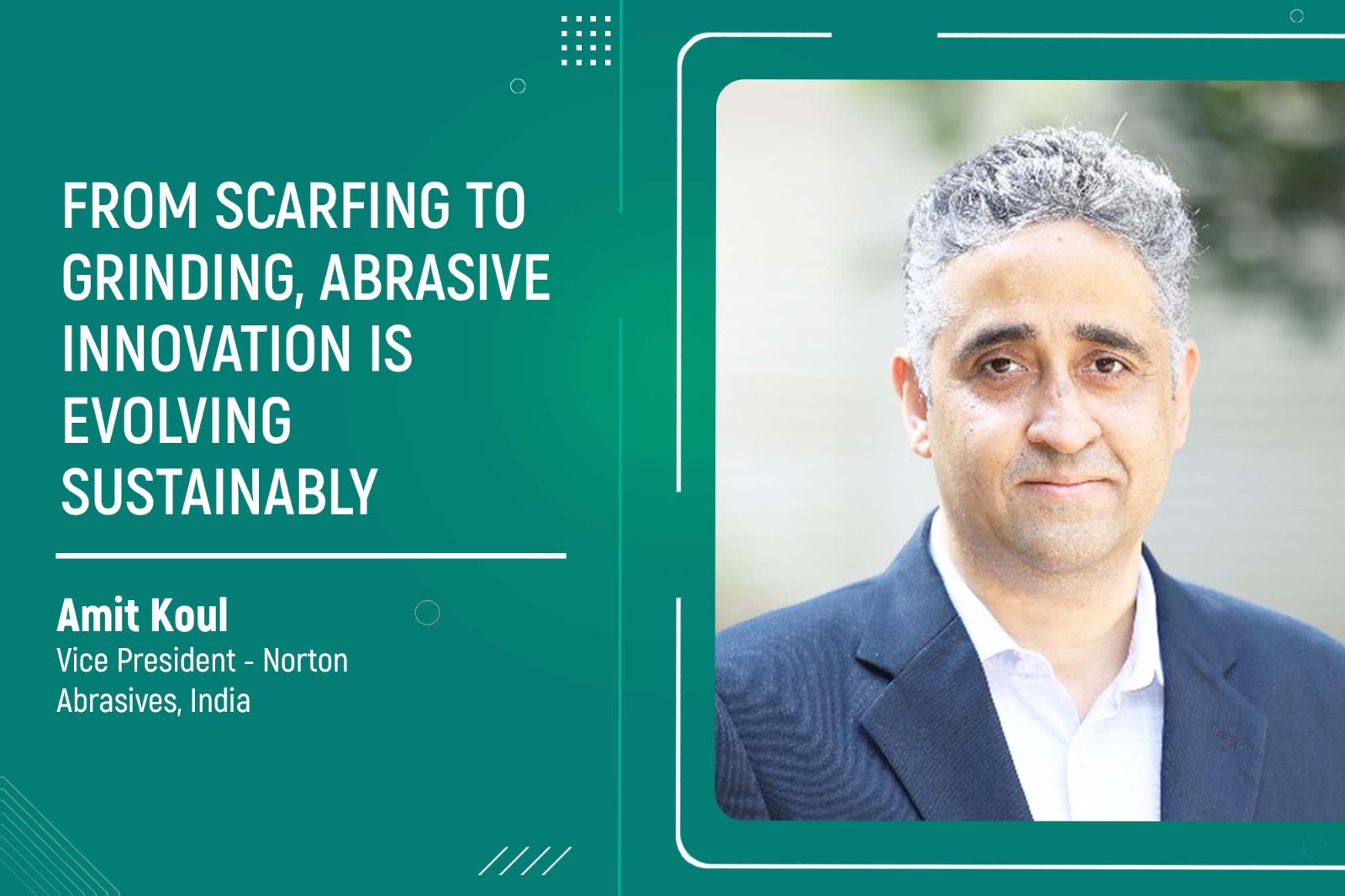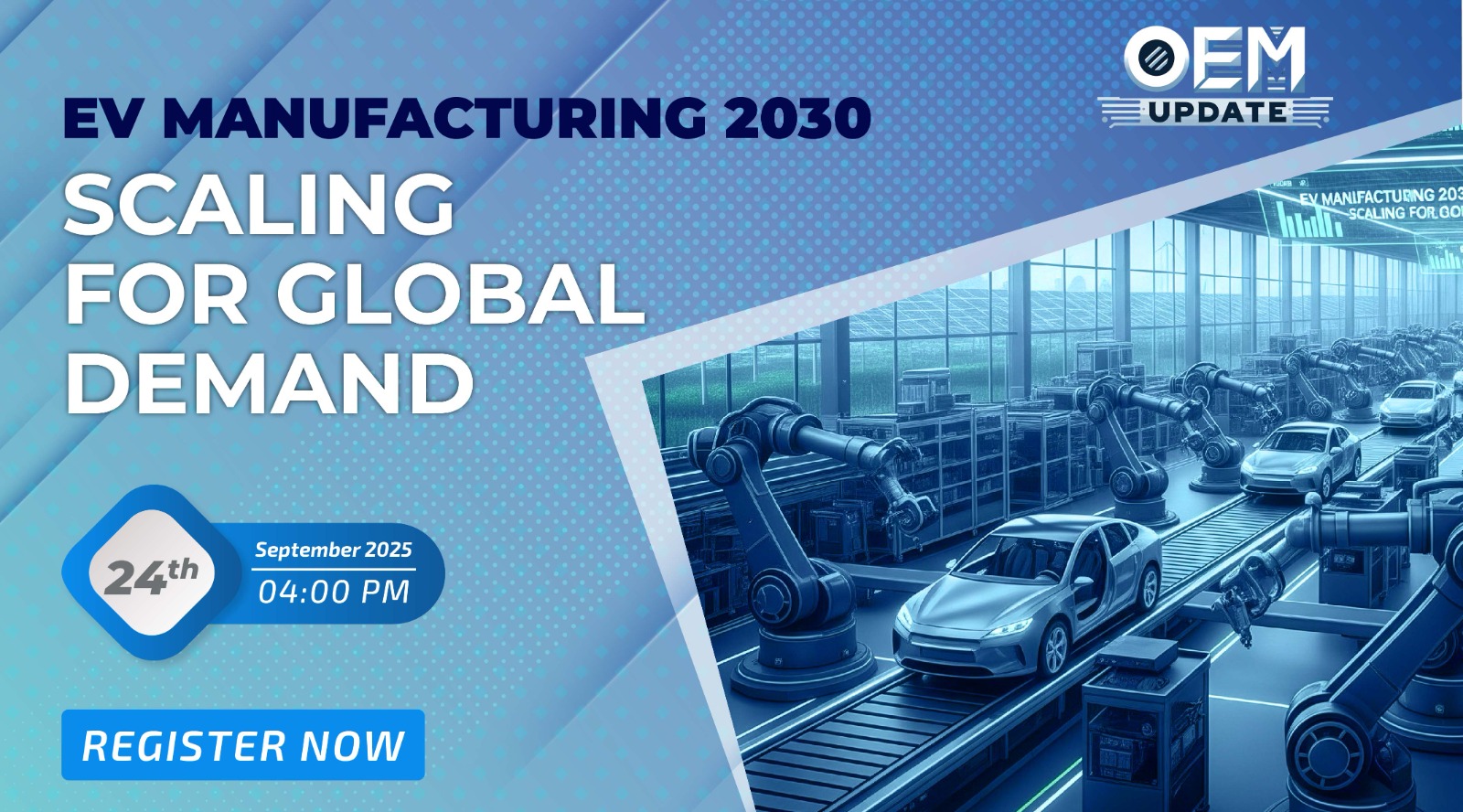Sustainability drives technology and product innovations
By OEM Update Editorial July 31, 2023 2:58 pm IST
According to Hari Singudasu, Vice President of Norton Abrasives India, their company constantly focuses on enhancing energy efficiency, implementing sustainable measures across their supply chain, and exploring innovative solutions using sustainable materials. By doing so, they actively contribute to advancing a more sustainable future.
Please talk about abrasives for a variety of industries.
Grindwell Norton Ltd. (GNO) consistently provides innovative solutions across various industries, including aerospace, defence, furniture, home décor, electronics, and solar glass panels. Abrasives play a crucial role in transforming surfaces daily. Whether it’s using abrasive paper for wood surface preparation, diamond blades for cutting through concrete and stone, grinding wheels for achieving superior surface finish and component geometry, or vacuum discs for restoring car bodywork, Norton offers a comprehensive product portfolio tailored to various industry sectors. These sectors encompass automobiles and auto components, foundry operations, metal fabrication, heavy engineering, woodwork and furniture, automotive aftermarket, construction, and home improvement.
What practices do you follow while adhering to sustainable manufacturing to reduce environmental impact?
As a leading Company dedicated to ‘Making the World a Better Home, ‘ Saint Gobain is committed to achieving Net Zero Carbon by 2050. We have set ourselves challenging intermediate goals on the different dimensions of sustainability.
Saint Gobain, dedicated to creating a better world, has committed to achieving Net Zero Carbon emissions by 2050. They have set ambitious milestones along various sustainability dimensions to drive their progress towards this goal.
All our manufacturing sites are implementing focused projects to reduce the Scope 1 & 2 impacts. These involve working on the energy mix, i.e., using greener energy wherever possible instead of conventional energy, moving to Natural gas from liquid fuels, setting up solar farms to generate electricity, or investing in an SPV involved in producing renewable energy, etc. We have also bought Renewable Energy Certificates to reinforce our commitment towards sustainable manufacturing. In addition, we are working on reducing the use of resources by conducting energy audits and acting on the gaps, taking up projects to improve the thru-put from our ovens and kilns.
We have started to measure the impact of Scope – 3, specifically related to supply chains, by consciously involving our suppliers and major logistics partners in our journey towards sustainability.
On the waterfront, we are doing everything possible to improve measurement, reduce consumption, recycle all the ETP/STP water and go for rainwater harvesting. We are spending Capex to upgrade the STPs/ETPs in all our plants to improve their effectiveness and maximise water recycling for non-potable purposes.
In addition to actively reducing waste in our manufacturing processes, we are focused on mitigating the environmental impact of waste generation. Alongside waste reduction initiatives, we are dedicated to converting the generated waste into energy. As part of this effort, we have successfully implemented a pilot Gasifier at our Bangalore factory, effectively transforming various waste forms into gas. Our long-term plan involves a complete setup to minimise waste sent to landfills.
Regarding the impact of the products we manufacture, we are working on the Product Life Cycle & Environmental Impact Assessment of our key products. We will be working on a pilot project to collect used grinding wheels from our customers to avoid them being dumped in landfills and try and reclaim whatever good quality abrasive raw material is there. We have plans to increase the proportion of recycled raw materials in manufacturing.
We are encouraging our employees to contribute to improving sustainability. We plan to convert employee transport vehicles to CNG / Hybrid or Electric, wherever possible, simultaneously setting up charging stations for Electric Vehicles in all our plants.
To ensure a rigorous evaluation of our R&D projects, we have implemented a sustainability score that meticulously filters out those with negative or low scores. Only projects that meet all parameters, including the fulfilment of the sustainability score, are selected. Within our company, we have established a dedicated fund to promote capital expenditure (Capex) investments in sustainability-related areas. Additionally, we incentivise and support new sustainability projects by providing Carbon Credits for each ton of CO2 reduction achieved.
We have implemented a systematic approach to capture and address the impacts of Scope 1 and Scope 2 emissions.
We have set targets for emission reductions for 2023 and up to 2030. To foster accountability and a sustainability-focused ecosystem, we have assigned a specific weightage for the sustainability score within the Key Result Areas of all employees, including their bonus schemes.
What sustainable option have you been exploring to minimise environmental impact?
Over the past few years, we have introduced many products that consume less power and deliver superior performance, making them highly sustainable options. In the coated products segment, we prioritise using paper-based materials derived from recycled pulp, eliminating the need for fresh or raw wood. Additionally, we are actively exploring the utilisation of recycled polyester or cotton for our abrasive cloth rolls. We have also developed biodegradable products in the non-woven and other sectors, significantly reducing their CO2 impact.
During our manufacturing processes, we employ bond systems that are fired at lower temperatures and have shorter production cycles, reducing energy consumption and carbon emissions. While these advanced materials may incur higher costs, their exceptional performance yields result up to five times better than those achieved with traditional materials. Moreover, they contribute significantly to lowering our carbon footprint.
Regarding waste disposal during manufacturing, we recognise the importance of managing this process to reduce CO2 emissions and the associated costs. As a temporary measure, we have established partnerships with cement companies to dispose of our waste, which is utilised in their processes, substantially reducing CO2 emissions.
How does sustainable manufacturing impact operational efficiency?
The integration of sustainable manufacturing practices has a profound impact on operational efficiency. By embracing sustainability, we drive innovation and create technologically advanced products that excel in performance, leading to increased profitability. Internally, we prioritise using sustainable raw materials, streamline manufacturing processes to reduce lead times, optimise production cycles, and adopt energy-efficient systems that minimise energy consumption in our manufacturing plants.
Collaborating closely with our logistics partners, we assess the distribution structure and actively monitor their carbon footprint, striving to establish a fully sustainable ecosystem. While we acknowledge the additional costs associated with waste disposal, these concerted efforts enable us to optimise resources and achieve significant cost savings.
By implementing these initiatives, we promote sustainability and enhance operational efficiency, improve product performance, and fortify our financial stability. Taking a holistic approach to sustainability, we strive for long-term success while minimising our environmental footprint.
How do your products ensure to promote sustainable manufacturing practices?
At GNO, we prioritise investments in engineering products that extend the lifespan of our offerings and provide enhanced value to end users. We actively undertake targeted efforts to develop products that effectively reduce dust, noise, heat, and vibration, ensuring a more sustainable and user-friendly experience.
We have initiated numerous programs at all levels, including active customer involvement, to emphasise the importance of sustainable products and processes. Our customers are highly conscious and well-informed about sustainable manufacturing practices, and they express a keen interest in adopting best practices to improve their manufacturing processes from a sustainability perspective.
Through Saint-Gobain’s global presence, we have access to a wealth of cross-learning opportunities, enabling us to imbibe and implement various best practices across our manufacturing sites in India. This facilitates the achievement of our sustainability goals while benefiting from the collective knowledge and experiences of our global network.
We are well-positioned to leverage the capabilities of our global and Indian R&D centres to develop innovative products and optimise our manufacturing processes. Our digital centres, coupled with our expertise and technical strengths, play a crucial role in streamlining our manufacturing operations, reducing waste, and minimising energy consumption. This concerted effort allows us to make our manufacturing leaner, more efficient, and more robust from a sustainability standpoint.
How are you contributing to a sustainable future alongside ongoing initiatives?
We have devoted significant efforts to address the energy intake and emissions associated with our diverse manufacturing processes, which cover Scope 1 & 2 Impacts. As we advance, we will focus on Scope 3 as well. Collaboration with our suppliers is a key aspect of this endeavour, involving engagement with raw material providers to ensure the sustainability and viability of their manufacturing practices. Additionally, we work closely with our logistic partners to assess and confirm the implementation of sustainable measures within their operations.
As part of our ongoing initiatives, we remain committed to enhancing our green energy portfolio and reducing energy consumption across all our plants. Process optimisation will be a focal point to minimise waste generation and further reduce energy usage. Concurrently, we will continue developing products that embody sustainability and superior performance. By utilising sustainable raw materials, we ensure our products can be easily recycled, contributing to a circular economy.
By consistently striving to improve our energy efficiency, promote sustainable practices throughout the supply chain, and innovate with sustainable materials, we reinforce our commitment to environmental responsibility and contribute to a more sustainable future.
Please highlight about Manufacturing Excellence System to optimise the production process.
Implementing our Manufacturing Excellence System (MES) across all Grindwell Norton plants has been a resounding success, providing a unified framework to streamline our manufacturing operations. The MES system monitors and optimises our production processes by offering real-time insights into production orders at every operational stage. This innovative approach brings forth several advantages, such as the ability to access real-time production data from both machines and operators, leading to improved operational efficiency and effective monitoring of service levels for our customers. Furthermore, it facilitates the establishment of an extensive data repository that captures essential process parameters.
One of the key advantages of the MES system is its capability to track process performance, including repeatability and reproducibility, thereby assisting us in minimising the overconsumption of raw materials, power, and fuel. Besides we have also implemented Energy Management Systems in our plants. By leveraging this data-driven approach, we can optimise our resource utilisation and minimise waste throughout our manufacturing processes.
In line with our commitment to sustainability, our Bangalore plant stands as a prime example. It has made significant strides toward utilising renewable energy sources. At present, 90 percent of its energy requirements are met through a green mix of renewable energy sources, with only 10 percent relying on the power supply from the government grid. This substantial deployment of renewable energy underscores our dedication to reducing our carbon footprint and promoting a greener future.
Through implementing the MES system and adopting renewable energy sources, we continue to strengthen our operational efficiency, minimise resource consumption, and further our commitment to sustainability across our manufacturing facilities.
Cookie Consent
We use cookies to personalize your experience. By continuing to visit this website you agree to our Terms & Conditions, Privacy Policy and Cookie Policy.







